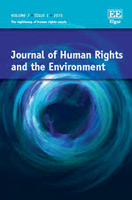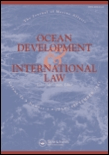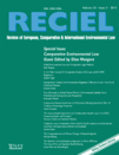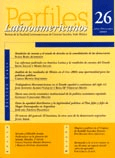
Journal of Human Rights and the Environment
Scope & Guideline
Bridging Human Rights with Environmental Stewardship
Introduction
Aims and Scopes
- Human Rights in Environmental Contexts:
The journal emphasizes the legal dimensions of human rights as they pertain to environmental issues, exploring how human rights frameworks can address environmental degradation and climate change. - Anthropocene Studies:
A significant focus is placed on the Anthropocene, examining how this new geological epoch affects legal and human rights frameworks, and how governance structures may adapt to these changes. - Indigenous Rights and Environmental Justice:
The journal investigates the intersection of Indigenous rights with environmental justice, highlighting the importance of traditional knowledge and the rights of Indigenous communities in environmental governance. - Climate Justice and Litigation:
There is a strong emphasis on climate justice, particularly through the lens of legal action and litigation, exploring case studies and the effectiveness of rights-based approaches to climate change. - Transnational Governance:
The journal delves into transnational governance issues, discussing the role of NGOs, international law, and collaborative efforts to address global environmental challenges.
Trending and Emerging
- Posthuman and Non-Human Rights:
An increasing number of articles are exploring posthuman legal frameworks, advocating for the recognition of non-human rights within environmental governance, which signals a transformative approach to legal subjectivity. - Climate Change and Human Rights Litigation:
There is a marked rise in publications discussing climate change litigation, particularly in relation to human rights, indicating a growing momentum for using legal avenues to address climate injustices. - Rights of Nature:
The concept of rights of nature is gaining traction, with more studies examining how legal systems can incorporate the rights of natural entities, reflecting a paradigm shift in environmental law. - Intersectionality in Environmental Justice:
Emerging discussions are increasingly incorporating intersectionality, recognizing how various social identities intersect with environmental issues, particularly in contexts of marginalized communities. - Global Governance and Climate Policy:
A trend towards examining global governance frameworks and their implications for climate policy is evident, highlighting the role of international cooperation in addressing environmental challenges.
Declining or Waning
- Traditional Environmental Law:
There has been a noticeable decrease in papers that focus solely on traditional environmental law without integrating human rights perspectives, indicating a shift towards more interdisciplinary approaches. - Local Environmental Activism:
Research focusing on grassroots or local environmental activism has diminished, possibly overshadowed by broader discussions on global governance and climate litigation. - Historical Perspectives on Environmental Rights:
Papers that analyze historical contexts of environmental rights have become less frequent, suggesting a shift towards contemporary issues and emerging legal frameworks.
Similar Journals

Actualidad Juridica Ambiental
Exploring the Intersection of Law and Environmental Sustainability.Actualidad Juridica Ambiental is a premier open-access journal dedicated to the field of environmental law, published by the CENTRO INT ESTUDIOS DERECHO AMBIENTAL-CIEDA-CIEMAT since its inception in 2011. With a focus on contemporary legal challenges in environmental policy and management, this journal serves as a vital platform for scholars, practitioners, and students committed to advancing the discourse in environmental jurisprudence. Although it currently holds a Scopus rank within the lower quartiles for both Social Sciences—Law and Environmental Science—Management, Monitoring, Policy, and Law, the journal aims to elevate its impact through rigorous research and critical analysis. By providing open-access content, Actualidad Juridica Ambiental ensures that vital insights and findings reach a broad audience, fostering knowledge sharing and collaboration in the legal and environmental sectors. The journal's evolving scope and commitment to addressing pressing environmental issues make it an essential resource for those dedicated to understanding and shaping the legal framework that governs our natural world.

Quaestio Iuris
Bridging Theory and Practice in LawQuaestio Iuris is a distinguished academic journal that has been making significant strides in the field of legal studies since its establishment. Published by the Universidade do Estado do Rio de Janeiro, this Open Access journal, operational since 2005, fosters a dynamic platform for the dissemination of innovative research, critical analysis, and scholarly discourse in various branches of law. With its ISSN 1807-8389 and E-ISSN 1516-0351, Quaestio Iuris is committed to enriching the legal academic landscape, ensuring that valuable insights are accessible to researchers, professionals, and students worldwide. The journal is dedicated to exploring contemporary legal challenges and contributing to the evolution of legal theory and practice, all while maintaining the highest standards of academic integrity. It is positioned to serve as an essential resource for those who aim to engage with the intricacies of legal scholarship.

OCEAN DEVELOPMENT AND INTERNATIONAL LAW
Empowering Research for Sustainable Ocean FuturesOCEAN DEVELOPMENT AND INTERNATIONAL LAW, published by Taylor & Francis Inc, is an esteemed journal dedicated to the interdisciplinary study of ocean governance, environmental law, and international relations concerning marine resources. With an ISSN of 0090-8320 and an E-ISSN of 1521-0642, this journal serves as a vital platform for researchers, legal scholars, and policymakers interested in the evolving challenges of ocean development in a globalized context. The journal has established itself as a resourceful publication, evidenced by its ranking in the 2023 Scopus categories, where it is positioned in the 75th percentile for Law and the 66th percentile for Political Science and International Relations. Operating for over four decades, from 1973 until 2024, it is pivotal for advancing knowledge and fostering dialogue on critical issues such as environmental sustainability, international maritime policies, and legal frameworks governing the seas. Despite being a subscription-based journal, OCEAN DEVELOPMENT AND INTERNATIONAL LAW remains influential, offering significant insights that contribute to the development of effective legal instruments and governance strategies for oceanic resources.

Review of European Comparative & International Environmental Law
Illuminating the path to effective environmental legislation.Review of European Comparative & International Environmental Law is a leading academic journal published by WILEY that serves as a vital platform for scholars and practitioners in the fields of environmental law, geography, and policy analysis. With its ISSN 2050-0386 and E-ISSN 2050-0394, it provides comprehensive insights into the comparative and international aspects of environmental legislation and governance. The journal is noted for its rigorous peer-review process and has achieved commendable rankings, including Q1 in Law and Q2 in Geography, Planning, and Development in the 2023 category quartiles. Furthermore, it holds impressive Scopus rankings, placing it within the 92nd percentile for social sciences law. The scope of the journal encompasses interdisciplinary research addressing contemporary environmental challenges, making it an invaluable resource for those engaged in the development, monitoring, and policy-making around environmental law. Published since 2013 and continuing through 2024, Review of European Comparative & International Environmental Law plays a crucial role in fostering scholarly dialogue and influencing environmental policy worldwide, ensuring access to state-of-the-art research and innovative solutions for a sustainable future.

ALBERTA LAW REVIEW
Illuminating the complexities of law and justice.ALBERTA LAW REVIEW, published by the University of Alberta, stands as a key academic journal in the field of law, contributing to the discourse on legal issues and developments in Canada and beyond. With an ISSN of 0002-4821 and an E-ISSN of 1925-8356, this journal has been pivotal since its inception in 1974, providing a platform for legal scholarship that spans a diverse range of topics, from constitutional law to social justice. Although it operates under a traditional subscription model, the journal's illustrious history and rigorously peer-reviewed content affirm its stature in advancing legal research and education. The Alberta Law Review not only serves as a resource for academics and students, but also offers legal practitioners critical insights and analysis pertinent to contemporary legal challenges. With a commitment to enlightening the discourse around law, it is an invaluable asset for anyone engaged in the legal profession or related fields.

Estudios de Derecho
Illuminating contemporary issues in law and political science.Estudios de Derecho is a distinctive open-access journal published by UNIV ANTIOQUIA, FAC DERECHO & CIENCIAS POLITICAS in Colombia, dedicated to advancing the fields of law and political science. Since its inception, the journal has aimed to foster scholarly discourse by publishing high-quality research articles, reviews, and theoretical contributions that reflect the evolving dynamics of legal frameworks and political structures, with a broad focus on both national and international contexts. As of 2023, it is categorized in the fourth quartile for both Law and Political Science and International Relations, ranking in the 21st and 15th percentiles respectively within Scopus metrics, indicating its role in contributing to emerging discussions despite its nascent standing in these fields. With an open access policy since 2012, Estudios de Derecho offers researchers, professionals, and students accessible insights into contemporary legal and political issues, emphasizing the importance of collaborative knowledge creation in an increasingly interconnected world.

International Environmental Agreements-Politics Law and Economics
Navigating the intersection of law, politics, and economics for a greener world.International Environmental Agreements-Politics Law and Economics, published by SPRINGER, is a leading journal dedicated to exploring the intersection of economics, law, and political science as they relate to international environmental agreements. With impressively high rankings in its respective categories—Q1 in Economics and Econometrics, Law, and Political Science and International Relations—this journal serves as a critical platform for rigorous scholarly discourse, addressing pressing global challenges and fostering understanding among policymakers and academics alike. The journal is indexed with an E-ISSN of 1573-1553 and maintains a strong presence in Scopus, excelling in multiple disciplines (ranked #40 in Law, #39 in Political Science, and #128 in Economics). Despite being a subscription-based journal, its comprehensive analyses and innovative perspectives make it an invaluable resource for researchers, professionals, and students committed to advancing sustainable environmental governance. Established in 2003, the journal continues to contribute to the field with engaging content that encourages interdisciplinary collaboration and furthers the study of international environmental treaties.

Environmental and Planning Law Journal
Illuminating Challenges in Environmental GovernanceEnvironmental and Planning Law Journal is a significant publication in the fields of law and environmental studies, published by LAWBOOK CO LTD in Australia. This journal, with the ISSN 0813-300X, has established itself as a crucial resource since its inception in 1984, providing a platform for scholarly discourse around legal frameworks affecting environmental planning and policy. Despite its coverage discontinuation in databases like Scopus, its impact remains recognized, achieving a rank of #455 in the Social Sciences Law category, indicating its relevance in legal scholarship. The journal is classified in the lower quartiles, yet it continues to address vital issues in geography, planning, and management of environmental law, engaging with contemporary challenges faced by policy-makers and practitioners. With no open access options currently available, the journal invites subscriptions and institutional access for its valuable content, making it a notable cornerstone for researchers, students, and professionals dedicated to navigating the complexities of environmental law and planning.

Chinese Journal of Environmental Law
Advancing the Intersection of Law and EnvironmentChinese Journal of Environmental Law, published by BRILL, is a leading interdisciplinary journal that focuses on the intersection of environmental issues and legal frameworks within the context of China and beyond. With an ISSN of 2468-6034 and an E-ISSN of 2468-6042, it has been a vital contribution to the field since its inception in 2017. The journal aims to provide a platform for researchers, policy-makers, and practitioners to discuss and analyze the evolving landscape of environmental law, particularly in the context of management and policy implications. Notable for its academic rigor, it holds a Q2 ranking in Law and a Q3 ranking in Management, Monitoring, Policy and Law. In 2023, the journal was ranked at #516 out of 1025 in Social Sciences - Law and #328 out of 399 in Environmental Science. Although not open access, it is accessible through various academic institutions, making it a critical resource for anyone interested in shaping sustainable legal practices. The Chinese Journal of Environmental Law is set to continue its convergence of knowledge through 2024, reflecting its commitment to publishing cutting-edge research that influences both policy and practice.

Perfiles Latinoamericanos
Fostering Critical Scholarship in Latin American StudiesPerfiles Latinoamericanos is a prominent academic journal published by FLACSO-MEXICO, dedicated to advancing scholarly discourse in the fields of Sociology and Political Science. Since its inception in 1992, this Open Access journal has made significant contributions to the understanding of Latin American societal and political dynamics, providing researchers, professionals, and students with valuable insights and analysis. With an ISSN of 0188-7653 and an E-ISSN of 2309-4982, the journal has established itself as a reliable source of knowledge, boasting a respectable Scopus rank within the 36th percentile among its peers. As of 2023, it holds a Q3 ranking in Sociology and Political Science, reflecting its commitment to maintaining rigorous academic standards and fostering impactful scholarship. Researchers can easily access its published articles, contributing to a wider dialogue on critical issues affecting the region. The journal’s coverage span from 2008 to 2024 affirms its ongoing relevance in the academic community.